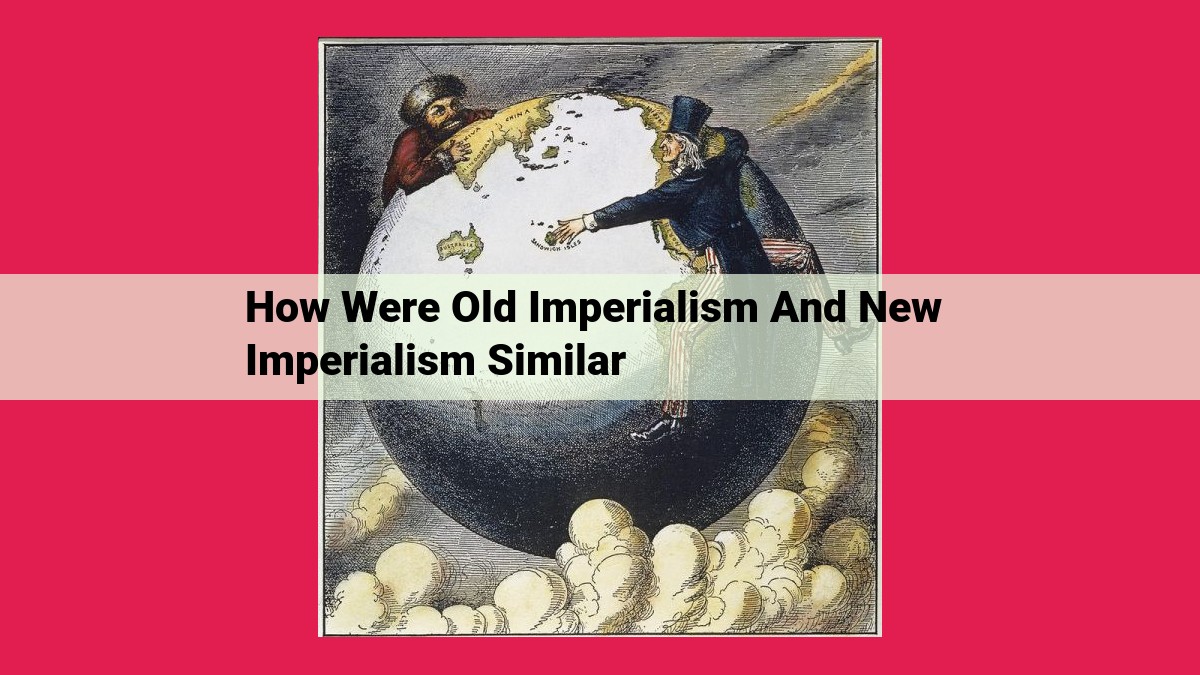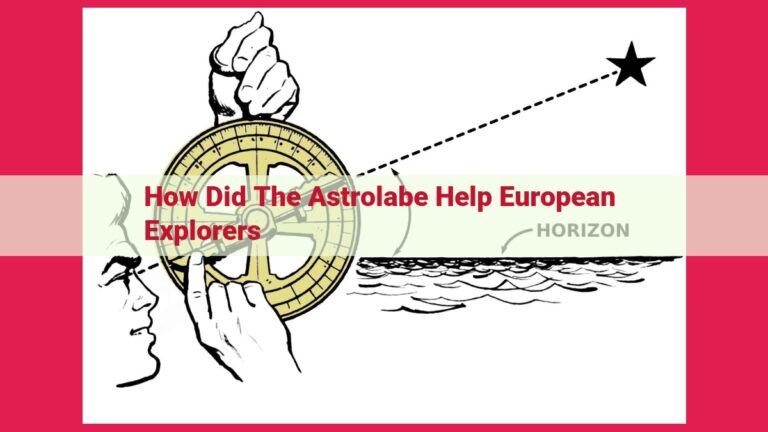Old Vs. New Imperialism: Economic Dominance, Strategic Control, And Cultural Supremacy

Old and new imperialism shared a pursuit of economic dominance, strategic control, and cultural superiority. Both employed military conquest, diplomatic pressure, and economic imperialism to establish control. While old imperialism focused on direct territorial acquisition, new imperialism favored indirect control through economic influence and political manipulation.
Imperialism: Exploring the Roots and Impacts of Global Dominance
Throughout history, empires have risen and fallen, leaving an enduring mark on the world’s political, economic, and cultural landscapes. Imperialism, the practice of extending a nation’s authority over foreign lands and peoples, has been a driving force behind this global transformation.
In this blog post, we will delve into the complex world of imperialism, exploring its motivations, methods, and far-reaching consequences. By examining both its historical origins and modern manifestations, we aim to shed light on the enduring legacy of imperial domination.
Motives for Imperialism
- Discuss the economic, political, and religious motives that drove both old and new imperialism.
Motives for Imperialism: A Tale of Greed, Power, and Belief
Throughout history, the siren call of imperialism has lured nations into a relentless pursuit of domination over others. Driven by a complex tapestry of economic, political, and religious motives, imperial powers have sought to control territories, resources, and peoples.
Economic Greed: The Lure of Wealth and Markets
One of the most powerful motives for imperialism has been economic gain. Empires coveted new lands for their untapped resources, such as precious metals, raw materials, and agricultural products. Control over these resources provided imperial powers with economic advantages and a source of wealth. Additionally, expanding their empires gave them access to new markets for their goods and services, boosting their economies further.
Political Ambition: The Quest for Power and Control
The pursuit of political power has also been a major driving force behind imperialism. Imperial powers sought to increase their global influence and consolidate their dominance over other nations. By establishing colonies and protectorates, they expanded their territorial reach, strengthened their militaries, and gained strategic control over waterways and trade routes.
Religious Zeal: The Spread of Faith and Ideals
Religious beliefs have often played a significant role in motivating imperialism. Empires believed in the superiority of their own religious practices and sought to spread their faith to other lands. Missionaries traveled to distant regions to convert indigenous populations, establishing churches, schools, and hospitals as a means of spreading their influence and consolidating their power.
The Interplay of Motives and a Legacy of Impact
The motives for imperialism were often intertwined, with economic, political, and religious factors reinforcing one another. This complex interplay created a powerful force that drove nations to embark on imperial conquests, leaving a lasting impact on the world.
Methods of Imperialism
Imperial powers employed a diverse array of tactics to establish and maintain their dominance over subject territories. These methods can be broadly categorized into four primary strategies:
Military Conquest
This direct and brutal approach involved the use of overwhelming military force to subjugate and occupy a target territory. By conquering and controlling strategic locations, imperial powers secured their presence and enforced their authority through military occupation and the imposition of martial law.
Diplomatic Pressure
Imperial powers often used diplomatic channels to exert influence and establish control without resorting to direct military intervention. This involved negotiating treaties, exerting economic pressure, and forming alliances to gain concessions and preferential treatment from weaker nations. By manipulating diplomatic situations, imperial powers extended their reach and influence without the need for overt military action.
Indirect Control
In some instances, imperial powers established indirect control over territories rather than directly occupying them. This allowed them to maintain influence without incurring the full costs and responsibilities of direct administration. Imperial powers often installed client regimes, supported local elites, and used economic dominance to exert control over these indirectly governed regions.
Economic Imperialism
Imperial powers also employed economic imperialism to exploit resources and establish economic dominance over subject territories. This involved gaining control over key industries, raw materials, and transportation networks. The exploitation of local economies for the benefit of the imperial power led to economic disruption, inequality, and the dependence of colonized nations.
**The Impacts of Imperialism: A Tale of Disruption and Transformation**
Imperialism, the imposition of one nation’s authority over another, has left an indelible mark on the world. Its consequences span across multiple spheres, shaping the economic, political, social, and cultural landscapes of both colonizing and colonized nations.
Economic Impact:
Imperialism has had a profound economic impact on colonized regions. The exploitation of natural resources and the imposition of cash crops disrupted local economies, benefiting the imperial powers at the expense of the colonized populations. This disruption caused impoverishment, starvation, and social unrest.
Political Impact:
Imperialism also had a significant political impact. The imposition of foreign rule and the suppression of local political systems created instability and resentment. This political upheaval often led to nationalist movements, conflicts, and the eventual decolonization of many territories.
Social Impact:
Imperialism brought social change and disruption. The introduction of Western culture, education, and healthcare systems had both positive and negative consequences. While some advancements improved living conditions, they also eroded traditional values and social structures, leading to cultural alienation and identity crises.
Cultural Impact:
Cultural imperialism, the imposition of the colonizer’s culture on the colonized, had a significant impact on societies. It led to the loss of indigenous languages, traditions, and beliefs, promoting the dominance of the imperial culture. This cultural upheaval had long-lasting effects on the identity formation and expression of post-colonial nations.
Imperialism’s legacy is a complex one, characterized by both progress and exploitation. It has shaped the global political, economic, and social order. Understanding its consequences is crucial for comprehending the current geopolitical landscape and the ongoing struggles for justice and decolonization worldwide.
Similarities Between Old and New Imperialism: Shared Goals and Methods
Throughout the annals of history, imperial powers have pursued dominance, control, and superiority through shared methods. Imperialism, in both its old and new forms, has been driven by similar motivations and strategies.
Economic Dominance
Economic exploitation has been a cornerstone of imperialism since its inception. Old empires sought riches in raw materials, labor, and markets, while new imperialists focused on economic control through trade, investment, and financial manipulation.
Strategic Control
Strategic considerations also fueled imperialism. Empires aimed to secure territory, protect trade routes, and wield power in key regions. From ancient military conquests to modern proxy wars, control over geography has been a crucial factor in imperial ambitions.
Cultural Superiority
Cultural hegemony has been another enduring goal of imperialism. Imperial powers have sought to impose their values, languages, and ways of life upon their colonized subjects. This process, known as cultural assimilation, aimed to legitimize imperial rule and dominate foreign societies.
In sum, the shared goals and methods of old and new imperial powers include the pursuit of economic dominance, strategic control, and cultural superiority. These motivations have shaped the course of history and continue to influence global dynamics today.
Differences Between Old and New Imperialism
Shift Towards Indirect Control:
In the era of old imperialism, European powers employed direct control, establishing colonies and administering them through their own officials. In contrast, new imperialism saw a shift towards indirect control. Imperial powers propped up local elites and limited direct intervention. This enabled them to maintain influence without the administrative burden of full-scale colonization.
Economic Exploitation:
While both old and new imperialism sought economic gain, their methods differed. Old imperialists focused on extracting raw materials and establishing plantations. New imperialists replaced this with economic investment and financial control. They established monoculture economies, exporting cash crops to fuel industrial growth in their home countries.
Technological Advancements:
New imperialism was greatly influenced by technological advancements. The steamship, telegraph, and machine gun facilitated communication and military superiority. These technologies gave imperial powers an unfair advantage over local populations, enabling them to expand their influence with greater ease.
Justifications:
Old imperialists often justified their actions based on religious superiority or the “civilizing mission”. New imperialists, on the other hand, employed economic and strategic arguments. They claimed that imperial control was necessary for access to resources and maintaining global order.
Impact on Local Populations:
The impact of imperialism varied depending on the period and region. Old imperialism often resulted in direct political control and disruption of local traditions. New imperialism had a more indirect impact, promoting economic dependence and transforming indigenous societies.
Lasting Legacies:
The legacy of imperialism is still felt today. Old imperialism left behind political boundaries and ethnic tensions. New imperialism shaped economic systems and global power dynamics. Understanding these differences is crucial for comprehending the complexities of imperialism throughout history.




